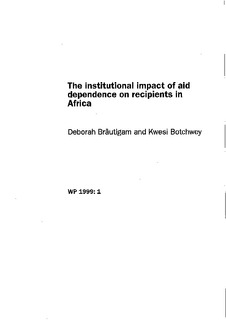The institutional impact of aid dependence on recipients in Africa
Working paper
Permanent lenke
http://hdl.handle.net/11250/2435740Utgivelsesdato
1999Metadata
Vis full innførselSamlinger
- Bora-import [434]
Sammendrag
Heavy aid dependence can have significant effects on institutions and governance. In Botswana, Mauritius, Korea and Taiwan, high levels of aid reinforced local capacity, enabling them to 'graduate' from most aid. But in many countries, the costs of aid dependence have been high. Aid dependence can overload institutions and weaken capacity and ownership, create revenue instability and fragment budgets, lower tax effort, and undermine accountability and democratic decision-making. These pernicious effects of aid dependence suggest that countries differ strongly in their institutional absorptive capacity, and that economic cooperation needs to be designed quite differently for countries with 'good' institutions and those without. Revised version of a pa per prepared for the Africa Economic Research Consortium (AERC) and the Overseas Development Council (ODC)'s Collaborative Research Project on Managing the Transition frorn Aid Dependency in Sub-Saharan Africa. The usual disclaimers apply. A very stimulating environrnent and support for Deborah Brautigarn's work on the second draft of this paper was provided by the Chr. Michelsen Institute in Bergen, Norway. The wonderful librarians at CMI tracked down the most elusive references, and deserve special thanks. Thanks are also due for comments received frorn participants at the AERC/ODC conference in Nairobi, May 21-22, 1998, where an earlier draft of this paper was presented, and for those received at a seminar at the Chr. Michelsen Institute, where a later version was presented, October 1, 1998. Art Goldsmith, Nicolas van de Walle, Carol Lancaster and Samuel Wangwe gave rnuch appreciated written comments on an earlier draft.
Utgiver
Chr. Michelsen InstituteSerie
CMI Working paperWP 1999: 1
